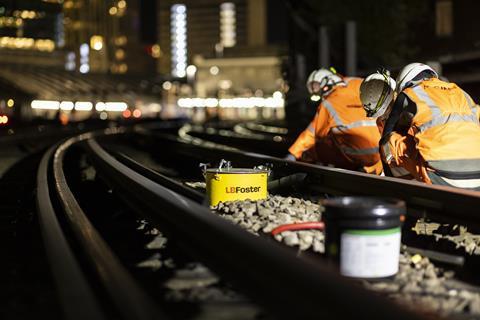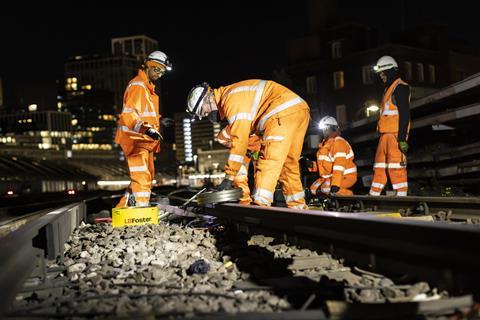
UK: Network Rail reports significant cost and time savings following the trial installation of novel lubrication equipment on switch & crossing components on the approach to London Waterloo station.
The turnouts experience very high levels of traffic, resulting in high rates of rolling contact fatigue and a correspondingly high turnover of S&C components. This has led to increased maintenance and renewal costs in recent years.
Furthermore, in early 2022, NR found that the existing automated lubrication devices were requiring a particularly high level of maintenance interventions. This prompted it to contact rail friction management specialist LB Foster to assess how the maintenance burden could be reduced.
The supplier proposed a trial of a novel hydraulic lubricator with a vertical lubricant reservoir that could be installed trackside in the tight confines of the track layout at Waterloo.

For the trial, LB Foster redesigned its PW Series hydraulic lubricator to distribute grease to the rail at the constrained and heavily loaded location. The lubricator is available with chamber capacities of 12·5 kg and 37·5 kg.
For the initial test period, a 12·5 kg unit was partially buried trackside, allowing trains to pass unhindered. As the train wheels pass, a plunger is depressed which activates a pump. This then pushes grease onto the applicator bars on the rail, and the grease is picked up by the train wheels and is spread over a pre-defined distance on the railhead.
A set of points was selected with the aim of lubricant pickup covering platforms 1, 2, 3 and 4. The result was that both automatic lubrication systems were removed from set of points 1564B, with good grease application rates recorded.
An examination of rates of two types of track defect during the trial period showed the effectiveness of the lubrication method. The benefits of the lubricant were cited as one of the contributing factors in a reduction in P8 and 053 defects, complemented by a proactive S&C grinding programme to increase the lifespan of the trackwork.
As a result of the trial, NR has identified a projected cost saving of £18 546·48 over five years where a single 12·5 kg capacity PW is installed on two sets of S&C units, when compared to the equivalent installation of three legacy automatic lubrication systems.
NR is now looking to install a further PW Series unit on another set of points with a view to removing more automatic lubrication systems in the Waterloo area.

‘It is easy to see the cost savings over time’, reports NR Project Manager Neil Cassidy. ‘There are 24 automatic lubrication systems at Waterloo on a 28-day replacement frequency, so we would look to fully complete the area by installing eight LB Foster units on a 42-day frequency. This affords an exceptional return on investment, as well as reducing the need for boots on ballast.’

‘The switch and crossing defects are primarily caused by track curvature on the entry/exit to the platforms, which increases the lateral forces suffered on the rail’, adds Jonathan Paragreen, General Manager at LB Foster Friction Management.
‘Our ultimate goal was to reduce the requirement for maintenance teams to work trackside, whilst extending the life of the switches and crossings. The resultant collaboration has seen exceptional results, both in terms of cost savings and enhanced operative safety through reduced time trackside.’



